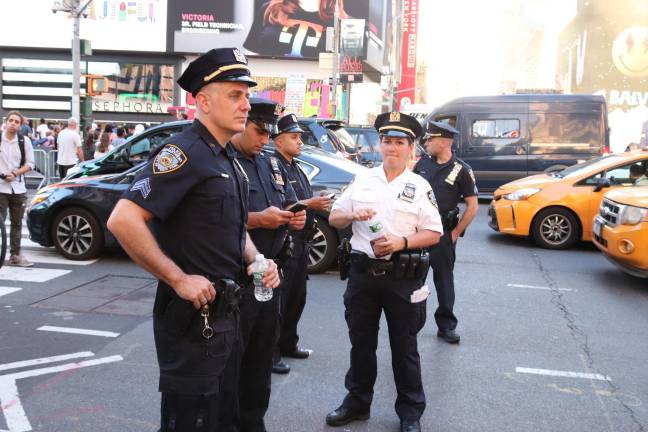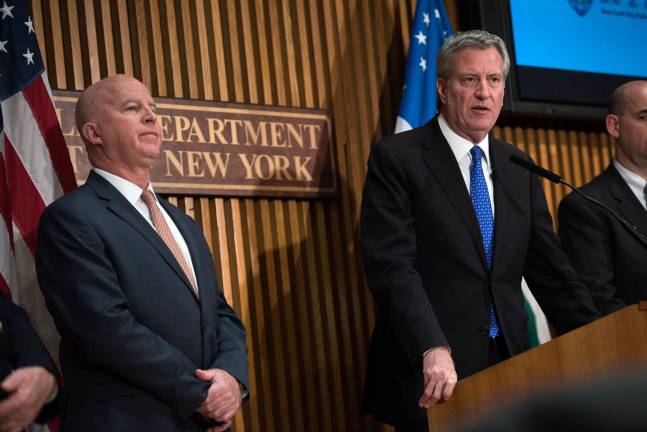The panic in Times Square
Why the mass shootings in El Paso and Dayton resonated in NYC
By Stuart Marques
Call it Fear City.
On Aug. 3, an immigrant-hating gunman opened fire in a mall and killed 22 terrified shoppers in El Paso, Tex. – 2,181 miles from New York City.
The next day, a gunman shot and killed nine innocent people near a bar in downtown Dayton, Ohio – 605 miles from here.
Just two days after that, dirt bikes backfired in Times Square in the heart of New York City and thousands of frightened tourists and theatergoers -- thinking the sounds were gunshots -- stampeded down Broadway, Seventh Avenue and various side streets and ducked into stores for safety. About a dozen people were injured.
"We have been conditioned to react that way whenever we hear about a mass shooting or experience something we associate with a terrible incident," Manhattan psychologist Alan Hilfer says. “It's almost a form of PTSD.”
He and others say that New Yorkers are more acutely aware of those kinds of dangers -- even though crime in the city is at record lows -- because we vividly remember the 9/11 attacks, and have repeatedly read or heard about terror plots, like one on May 1, 2010, when a man named Faisal Shahzad ignited a car bomb on a warm night in a crowded Times Square. And last week, on Aug. 6, Cesar Sayoc, a Florida body builder and Trump fan, was sentenced to 20 years in prison for sending pipe bombs to prominent Democrats and CNN offices in New York.
“Everything changed after 9/11,” Hilfer says. “My office is in a flight path and every time we heard a loud plane overhead, we froze. We've been conditioned to react to the danger signs.”
Psychologist Steven Klee, who had offices in Manhattan but now is an associate executive director at Green Chimneys Children's Services in Putnam County, agrees.
"We even have a name for it," Klee says. "Psychologists call it the Generalization Effect. It means that people tend to react in the same way to similar incidents. If you walk past a supermarket when there's a shooting and you freeze up, you're likely to have that same reaction or association every time you walk past that supermarket. The supermarket would trigger your memory of a traumatic event ... shootings, even far away, will stir that fear."
Fear of Gun Violence
The panic in Times Square was real enough to cause the NYPD to frantically tweet out that there was no active shooter in the area and urging people to be calm.
Mayor Bill de Blasio followed suit, tweeting: “Times Square is safe and secure, but the panic and fear people felt tonight was all too real. Nobody should have to live in fear of gun violence.”
It's not the first time sounds mistaken for gunfire caused panic here.
Last September, a loud pop caused by people stepping on plastic water bottles just after Cardi B finished a performance at the Global Citizen Festival in Central Park caused a panicked stampede that sent hundreds of concert goers running for safety and screaming for help.
In August 2016, police received calls of gunfire in two separate terminals at Kennedy Airport. Thousands of frightened travelers ran for their lives as police searched for a shooter. Some flights were diverted to Buffalo and parts of the Van Wyck Expressway were closed. It turned out that what some thought was gunfire was cheering and clapping of people who had just watched Usain Bolt win a sprint Gold Medal at the Rio Olympics.
“People react this way because these types of shooting incidents like in El Paso and Dayton are random and can happen anywhere,” Klee says. “We’ve become super-sensitive to these things and that can lead people to overreact. I don’t think anybody feels completely safe in any part of the country. It can happen at a concert, in a bar, in a church or synagogue or in Times Square.”
Hilfer says that in the context of the number of mass shootings in America – there have been 248 mass shootings as of July 31 – the tendency to panic at what sounds like gunfire is “almost a normal reaction ... the reality is that things have changed” and that New Yorkers may feel that more keenly than others.
“You just have to hope that you’re not in the wrong place at the wrong time.”
"I don’t think anybody feels completely safe in any part of the country. It can happen at a concert, in a bar, in a church or synagogue or in Times Square.”
Psychologist Steven Klee

